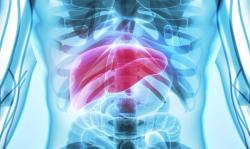
OR WAIT null SECS
FDA Grants Breakthrough Therapy Designation to Survodutide for Noncirrhotic MASH
In addition to the Breakthrough Therapy Designation, Boehringer Ingelheim announced the initiation of 2 phase 3 trials in adults with MASH and fibrosis and compensated MASH cirrhosis.
Boehringer Ingelheim has announced that the US Food and Drug Administration (FDA) has granted Breakthrough Therapy Designation to survodutide (BI 456906), a dual glucagon/glucagon-like peptide-1 (GLP-1) receptor agonist, for the treatment of adults with noncirrhotic metabolic dysfunction-associated steatohepatitis (MASH) and moderate or advanced fibrosis (stages 2 or 3).1
In addition to the Breakthrough Therapy Designation, which was based on phase 2 data of survodutide in patients with noncirrhotic MASH and moderate to advanced fibrosis published earlier this year, Boehringer also announced the initiation of a pair of phase 3 clinical trials of survodutide for the treatment of adults living with MASH and fibrosis as well as those living with compensated MASH cirrhosis, LIVERAGE and LIVERAGE-Cirrhosis.1
“Given the significant burden of MASH and the limited therapeutic options, novel approaches are urgently needed,” Arun Sanyal, MD, a professor of medicine at Virginia Commonwealth University School of Medicine and director of VCU’s Stravitz-Sanyal Institute for Liver Disease and Metabolic Health, said in a press release.1 “The Phase III LIVERAGE studies represent an exciting opportunity to investigate whether survodutide, with its dual glucagon and GLP-1 receptor agonist mechanism of action, can help address this significant medical need.”
Currently, resmetirom (Rezdiffra) is the only FDA-approved treatment for noncirrhotic nonalcoholic steatohepatitis (NASH) with moderate to advanced fibrosis. The oral, thyroid hormone receptor-β selective agonist received accelerated approval on March 14, 2024, following 18 studies in its clinical development program.2
In the absence of an FDA-approved therapeutic prior to this decision, weight loss served as the cornerstone of MASH management. Although GLP-1 receptor agonists have emerged as prominent weight loss tools, their apparent lack of direct impact on fibrosis has limited their utility in MASH.3
A glucagon/GLP-1 receptor dual agonist, survodutide activates both the glucagon and GLP-1 receptors, which play a role in controlling metabolic functions. It is being evaluated in a “robust” phase 3 clinical development program, including the LIVERAGE studies for people living with MASH and fibrosis and the SYNCHRONIZE studies for people living with overweight or obesity.1
Survodutide is licensed to Boehringer Ingelheim from Zealand Pharma, with Boehringer solely responsible for development and commercialization globally. However, Zealand has a co-promotion right in the Nordic countries.1
Phase 2 data for survodutide were presented at the 2024 European Association for the Study of the Liver (EASL) Congress in Milan, Italy, and published in the New England Journal of Medicine in June, with results demonstrating the dual glucagon and GLP-1 receptor agonist’s ability to improve MASH without worsening fibrosis. Compared with placebo, survodutide was superior for histologic improvement with no worsening of fibrosis, and a greater percentage of patients taking survodutide achieved reduction in liver fat content by ≥ 30% and improvement in fibrosis by ≥ 1 stage.4
Now, survodutide will progress to a pair of global phase 3 trials investigating the efficacy and safety of survodutide in adults with MASH and fibrosis stages 2 or 3 and in those with compensated MASH cirrhosis (stage 4). According to a press release from Boehringer, LIVERAGE will enroll approximately 1800 adults, and LIVERAGE-Cirrhosis will enroll approximately 1590 adults. In each trial, participants will be randomized to receive weekly injections of either survodutide, reaching a maximum dose of 6 mg, or placebo.1
As described in the press release, LIVERAGE consists of 2 parts. The 2 primary endpoints of part 1 are the proportion of patients achieving MASH resolution without worsening of fibrosis, and ≥ 1-point improvement in fibrosis without worsening of MASH, after 52 weeks of treatment. The primary endpoint of part 2, which will continue for approximately 7 years, is the time to first occurrence of liver-related events or all-cause mortality.1
"With the number of MASH patients expected to rise worldwide in the coming years, advancing our understanding of this condition is more crucial than ever," said Shashank Deshpande, head of Human Pharma at Boehringer Ingelheim.1 "Our Phase III trial program with survodutide is one of the largest of its kind in terms of countries and sites involved. Notably, the program’s innovative design, which specifically targets advanced fibrosis including patients living with cirrhosis due to MASH – the most in-need population, is set to redefine the treatment landscape. The Breakthrough Therapy designation underscores that this potential best-in-class therapy has an opportunity to fundamentally change how MASH is treated."
References
- Boehringer Ingelheim. Boehringer receives U.S. FDA Breakthrough Therapy designation and initiates two phase III trials in MASH for survodutide. October 8, 2024. Accessed October 8, 2024. https://www.boehringer-ingelheim.com/human-health/metabolic-diseases/survodutide-us-fda-breakthrough-therapy-phase-3-trials-mash
- Brooks, A. Resmetirom (Rezdiffra) Receives Historic FDA Approval for Noncirrhotic NASH. HCPLive. March 14, 2024. Accessed October 8, 2024. https://www.hcplive.com/view/resmetirom-rezdiffra-receives-historic-fda-approval-for-noncirrhotic-nash
- Brooks, A. Stephen Harrison, MD: The Role of Weight Loss, Resmetirom in NASH Management. HCPLive. March 18, 2024. Accessed October 8, 2024. https://www.hcplive.com/view/stephen-harrison-md-weight-loss-resmetirom-nash-management
- Brooks, A. Survodutide Improves MASH Without Worsening of Fibrosis, Reduces Liver Fat. June 7, 2024. Accessed October 8, 2024. https://www.hcplive.com/view/survodutide-improves-mash-without-worsening-of-fibrosis-reduces-liver-fat
Related Content:


